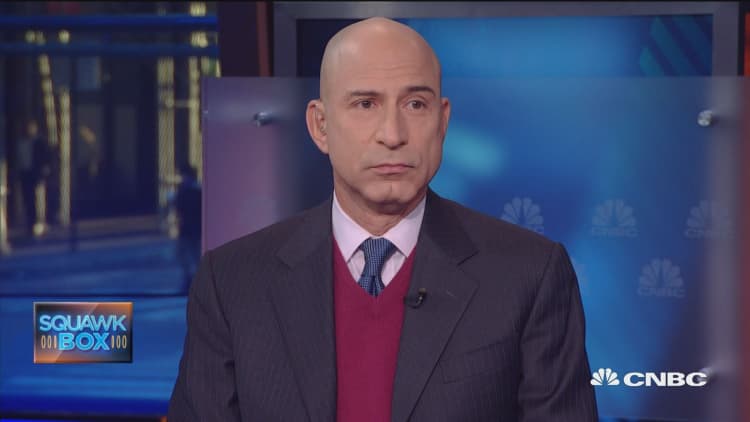
Just as corporate earnings emerged from a four-quarter earnings recession, one of the factors behind the slump is rearing its head again: the strong U.S. dollar.
The greenback's strength will likely hit companies with large international exposure, such as tech stocks, and likely derail the postelection stock market rally that's taken the Dow Jones industrial average to record highs and the and Nasdaq composite close to their all-time highs.
"If you start to see the continued strength in the dollar, you'll see these internationally focused companies start to see some underperformance," said Paul Hickey, co-founder of Bespoke Investment Group. "Different sectors will be impacted differently."
Since Donald Trump's surprise election win last week, the has climbed more than 5 percent on increased economic growth expectations as Trump has promised to spend on infrastructure and cut taxes as president. It has also moved higher with Treasury yields, which have leaped to multimonth highs. The dollar index hit its highest in nearly 14 years on Thursday, and it moved even higher Friday before retreating.
A strong dollar makes U.S.-produced goods more expensive for customers overseas. Along with a plunge in oil prices, dollar strength was a frequently cited negative in corporate earnings reports in the last year.
"The largest impact on earnings was likely in the second quarter of 2015 when the dollar index was nearly 20 percent higher on average, year-over-year," Lindsey Bell, senior analyst at CFRA Research, said in an email. "The four quarters that followed resulted in declines in earnings growth, but you have to remember that the plunge in oil prices from mid-2014 to earlier this year also played a role in all of those growth rates."
Bell estimates negative impact on earnings per share of about 5 to 10 percent, depending on the dollar's strength, although companies with large international exposure do hedge against currency fluctuations.
Energy, information technology and materials sectors are the most exposed to the dollar, with more than half of their total sales from overseas, according to S&P Dow Jones Indices.
Stocks of technology hardware companies such as Intel, Texas Instruments and Qualcomm covered a significant portion of the 58 companies in the Russell 1000 with more than 70 percent of their revenue from overseas, according to a CNBC analysis using Bespoke's International Revenue Database.
When the dollar index climbed at least 3 percent in 10 trading days since, those three tech stocks tended to fall several percentage points over the next 20 trading days, according to historical analysis using Kensho. The Russell 1000 was little changed over the same time period.
Tech stocks are among the most at risk from dollar strength, said JJ Kinahan, chief strategist at TD Ameritrade. "It's getting harder to sell their things and getting more expensive to pay for things," he said. There's also potentially "regulation and tariffs that hit."
Trump has called for major overhauls of existing trade agreements, a tougher stance on immigration, and a 45 percent tariff on goods imported from China.
The sharp moves in the dollar also come ahead of the 's highly expected rate hike in December, and potential rate increases next year.
To be sure, while the U.S. dollar index approaches 14-year highs, it is only about 1 percent higher over the last 12 months.
"Certainly growth of interest rates would tend to increase the value of the dollar, but inflation running ahead of interest rates would diminish the dollar," said Jack Ablin, chief investment officer at BMO Private Bank.
Disclosure: CNBC's parent NBCUniversal is a minority stakeholder in Kensho.


